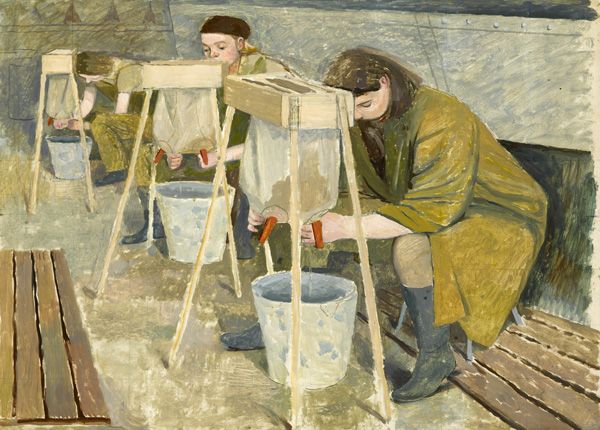
Milking Practice with Artificial Udders, 1940
Framed (ref: 5570)
Oil on paper, laid on board
Tags: Evelyn Dunbar oil panel war women work 2.dunbar 2022 49 pictures Rediscovering Women Artist WOMEN World War II Paintings by British Artists

Tags: Evelyn Dunbar oil panel war women work 2.dunbar 2022 49 pictures Rediscovering Women Artist WOMEN World War II Paintings by British Artists
Provenance: Margaret Goodwin
Exhibited: Evelyn Dunbar - The Lost Works, Pallant House Gallery, October 2015 - February 2016, cat 85.
WW2 - War Pictures by British Artists, Morley College London, 28 October -23 November 2016, cat 78.
Literature: Evelyn Dunbar - The Lost Works, Sacha Llewellyn & Paul Liss, July 2015, cat. 85, page 130.
WW2 - War Pictures by British Artists, Edited by Sacha Llewellyn & Paul Liss, July 2016, cat 78, page 118-119.
Llewellyn, Sacha, et al. Women Only Works on Paper. Liss Llewellyn, 2021, p. 62.
In May 1940, Evelyn Dunbar, the only woman to receive a full-time salary from the War Artists’ Advisory Committee (WAAC), was posted to Sparsholt Farm Institute, near Winchester, to paint Women’s Land Army recruits in training. Painted around the time Dunbar was considering how to illustrate A Book of Farmcraft, her painting Milking Practice with Artificial Udders (see overleaf) shows three novice Land Girls, struggling to learn the rudiments of milking. The Land Girl in the middle has assumed the recommended posture. The painting is squared for transfer – it is a study for the nearly identical finished painting in the Imperial War Museum.
In Study for Women’s Land Army Dairy Training, operations have moved from artificial to real. Dunbar’s perspective lines lead the viewer to the dairy wash-house beyond, itself the setting for Milking Practice with Artificial Udders. The extensive colour notes would have served as an aide-memoire to guide her when she returned to her studio in Rochester to work the sketch up. However, Dunbar appears to have never completed this composition and she later used the same title Women’s Land Army Dairy Training for a different WAAC commission. By September 1943, a quarter of the 80,000-strong Women’s Land Army were involved in milking.